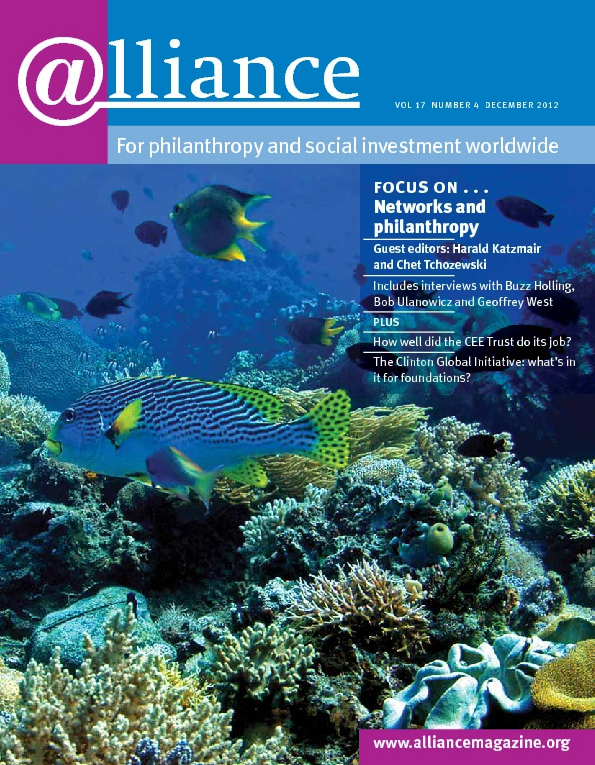Given the venue of the AFF conference ‘Maximizing Philanthropic Resources in Times of Change and Austerity’, held 16-18 September in Cairo, you would have expected extensive political analysis of the Arab Spring, its origins, the future, etc. Indeed, there was some, but first and foremost this was a meeting of philanthropists aiming to be practical, to learn and to position themselves to make a concrete contribution to societies that are in dire need of ‘a new social contract between government, private sector and civil society’ as Dr Gannat El-Samalouty of the Sawiris Foundation remarked in her opening words.
The Arab Spring manifested generalized civic distrust in all government structures. In many countries this went hand in hand with distrust of NGOs and some of the traditional CSOs who were felt to have sided with these official institutions, or at least kept quiet. That pressure to conform to government and state has not altogether subsided. To date, throughout the region independent NGOs continue to be exposed to high levels of pressure if not repression from state and security forces. Existing legal frameworks mean that foundations and philanthropists in the Arab region are also quite dependent on the goodwill of state actors to be able to operate, both formally and informally.
In the region there remains a considerable amount of philanthropy that is of a charitable nature, and there is an emphasis on activities directly operated by foundations. NGOs are not considered particularly reliable partners and some foundations are even considering scaling back their grantmaking in favour of operating programmes where they can operate with a strong business rationale and more focus.
Over the two days of the conference, philanthropy in all its forms was debated and contextualized and a host of practical concerns and issues came to the fore. Indeed, the Arab region has it all: venture philanthropy, catalytic philanthropy, strategic philanthropy, standard grantmaking, regranting, family foundations, charity, zhakhat, waqf, community foundations, social justice philanthropy, funder plus, social corporate responsibility …. nothing is standard. And I predict the Arab region may take a lead in inventing new modalities. Considering the fact that the legal and political environment is more enabling for intra-regional commerce compared to cross-border philanthropy, one conference participant suggested for example that philanthropists should register for-profit companies to more easily work towards their mission across borders in the region.
So they are all different, and they have different operating rationales, ideologies and vocabularies. But they also share concerns. There is for example a longstanding, shared concern regarding youth employment. At the conference an interesting debate ensued as to whether you have to focus on the employability of the individual or the employment generated by markets and government policies. Tarik Yousef, CEO of Silatech, a new regional initiative promoting job creation, entrepreneurship and access to capital for Arab youth, encouraged philanthropists to experiment, innovate and invest, preferably in alliances with other actors. He felt that it would make no sense for philanthropists to await the long-term structural change and reform of institutions – both formal and informal – that he emphasized is so much needed. Instead of waiting for that reform, he felt philanthropy could feed into that institutional change by nurturing experiments, scaling up with partners experiments that work. As someone in the audience remarked, that means philanthropists also have to take the risk and be prepared to invest in experiments that fail.
We learned from the practical examples that even experiments take their time to mature: INJAZ started as early as 1999 and it took more than 10 years to scale the programme to 145,000 beneficiaries and 4,000 volunteers. The biggest challenge remains to involve the private sector said Deema Bibi, CEO of INJAZ, and programmes like INJAZ also show that targeting individuals does not necessarily change institutions, eloquently illustrated by Youssef’s remark that in the region women are more and more employable, but not more employed.
It was unfortunate that there was not more time to discuss the ins and outs of replicating and scaling up experiments. It is my impression that that is easier said than done. In the world of development cooperation we used to have a ‘disease’ called pilotitis and you certainly do not want to go there.
The session on community foundations moderated by Jenny Hodgson of the Global Fund for Community Foundations illustrated again that revolutions can be swift, but change does not come overnight. Community foundations invest in programmes but also in building and nurturing relationships with and within the community. That takes time and resources. And sometimes you even have to go back in the past, as explained by Dr Marwa El Daly, founder and chair of the Waqfeyat Al-Maadi Community Foundation, which funds a series of community activities reviving longstanding philanthropy traditions such as waqf and zhakhat.
In a session on social justice philanthropy, Hillary Gilbert from the Community Foundation for South Sinai explained that some of the foundation’s activities are charity while others slowly but surely pursue social change: ‘Egyptian and Bedouin trustees are taking risks as it is, so we tend to combine the two types of work.’ In the end, it is a matter of balance all along. Rania Hamoud, managing director of the Mansoor Foundation for Development, explained to me how their board in March this year moved quickly and agreed – within five months after the revolution – long-term joint ventures with two community foundations, enabling them both to address short-term needs and to invest in the long term.
These are only some grains from the rich harvest of experiences that were shared at the conference. Thank you all for sharing and thank you Arab Foundations Forum for putting together such a great conference. Remember to check the AFF website in a few weeks for the full conference report. GrantCraft is currently working with AFF and the Gerhart Centre on a guide based on experiences in the region.
Rosien Herweijer is director of GrantCraft at the European Foundation Centre.
Event: Arab Foundations Forum conference
Date: 16-18 September 2012
Location: Cairo, Egypt
Organizer: Arab Foundations Forum






Comments (0)